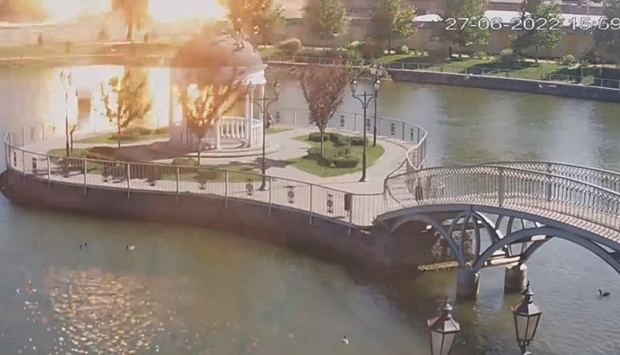* Moscow claims blaze at mall caused by strike on arms depot
* 36 people unaccounted for
* 'I flew head first, splinters hit my body,' survivor says
* G7 countries announce aim to cap price of Russian oil
Exhausted firefighters searched on Tuesday for survivors in the rubble of a Ukrainian shopping mall, where authorities said 36 people were missing after a Russian missile strike that killed at least 18.
The attack, in the central city of Kremenchuk far from any frontline, drew a wave of global condemnation, with France's Emmanuel Macron among leaders who called it a "war crime".
Ukraine said Moscow had killed civilians deliberately. Russia said it had struck a nearby arms depot and falsely claimed that the mall was empty.
At a summit in Germany, leaders of the G7 industrialised democracies announced plans for a price cap on Russian oil, designed to starve Russia of the resources for war without exacerbating a global economic crisis.
Next up will be a NATO summit in Spain, at which the Western military alliance is expected to announce hundreds of thousands of troops shifting to a higher state of alert and an overhaul of its strategic framework to describe Moscow as an adversary.
Relatives of the missing in Kremenchuk were lined up at a hotel across the street from the wreckage of the shopping centre, where rescue workers had set up a base.
Weary firefighters sat on a kerb after a night battling the blaze and searching for survivors, mostly in vain.
Oleksandr, dousing his face from a water bottle, said his team had worked all night. "We pulled out five bodies. We didn't find anybody alive," he said.
Ukrainian President Volodymyr Zelenskiy accused Russia of deliberately targeting civilians in "one of the most defiant terrorist attacks in European history".
Russia's defence ministry said its missiles had struck an arms depot storing Western weapons, which exploded, causing the blaze that spread to the nearby mall.
Kyiv said there was no military target in the area.
"Russia's goal is for as many Ukrainians as possible to close their eyes forever, for the rest to stop resisting and submit to slavery," Andriy Yermak, chief of Ukraine's presidential staff, said on Twitter. "That's the way the terrorist state acts."
Russia described the shopping centre as disused and empty. But that was contradicted by the relatives of the dead and missing, and the dozens of wounded survivors such as Ludmyla Mykhailets, 43, who had been shopping there with her husband when the blast threw her into the air.
"I flew head first and splinters hit my body. The whole place was collapsing," she said at a hospital where she was being treated.
G7 leaders said the attack was "abominable". Russian President Vladimir Putin and those responsible would be held to account, they said in a statement.
Western countries have imposed economic sanctions on Russia, but so far have failed to curtail Moscow's main source of income: oil and gas export revenue, which has actually increased as the threat of supply disruption has driven up global prices.
At the end of its summit, the G7 announced a new approach - leaving Russian oil on the market while imposing a cap on the price countries could pay for it.
"We invite all like-minded countries to consider joining us in our actions," they said in a communique.
The United States also issued a new round of sanctions that prohibit imported Russian gold as well as target Russia's state-owned defence conglomerate, Rostec, and multiple banks.
With summit action now shifting to NATO, White House National Security Adviser Jake Sullivan said a new strategic concept would "describe in stark terms the threat that Russia poses and the way in which it has shattered peace in Europe".
That marks a departure from post-Soviet NATO policy which cast Moscow as a potential partner.
Dmitry Rogozin, a former Russian ambassador to NATO and now head of Russia's space agency, responded by releasing satellite pictures and coordinates of the summit venue, the Pentagon, White House and other Western state buildings.
"Today, the NATO summit opens in Madrid, at which Western countries will declare Russia their worst enemy," Rogozin wrote on social media. "Roscosmos publishes satellite photographs of the summit venue and the very 'decision centres' that support Ukrainian nationalists."
Russia denies intentionally targeting civilians in its "special military operation" that has destroyed Ukrainian cities, killed thousands of people and driven millions from their homes.
The attack on Kremenchuk came after days of increasing Russian missile strikes a long distance from the frontline, including the first attacks on the capital Kyiv for weeks.
In Kharkiv, Ukraine's second largest city where Russian troops were pushed back in a counter-offensive in May, authorities said nine people were killed by shelling that hit targets including apartment buildings and a school.
The U.N. Security Council, where Moscow wields a veto, will meet later on Tuesday at Ukraine's request following the Kremenchuk attack. U.N. spokesperson Stephane Dujarric said the missile strike was deplorable.
Ukraine endured another tough day on the battlefields of the eastern Donbas region following last week's loss of the now-ruined city of Sievierodonetsk.
Russian forces are trying to storm Lysychansk, across the Siverskyi Donets River from Sievierodonetsk, to complete their capture of Luhansk, one of two eastern provinces Moscow aims to conquer on behalf of separatist proxies.

